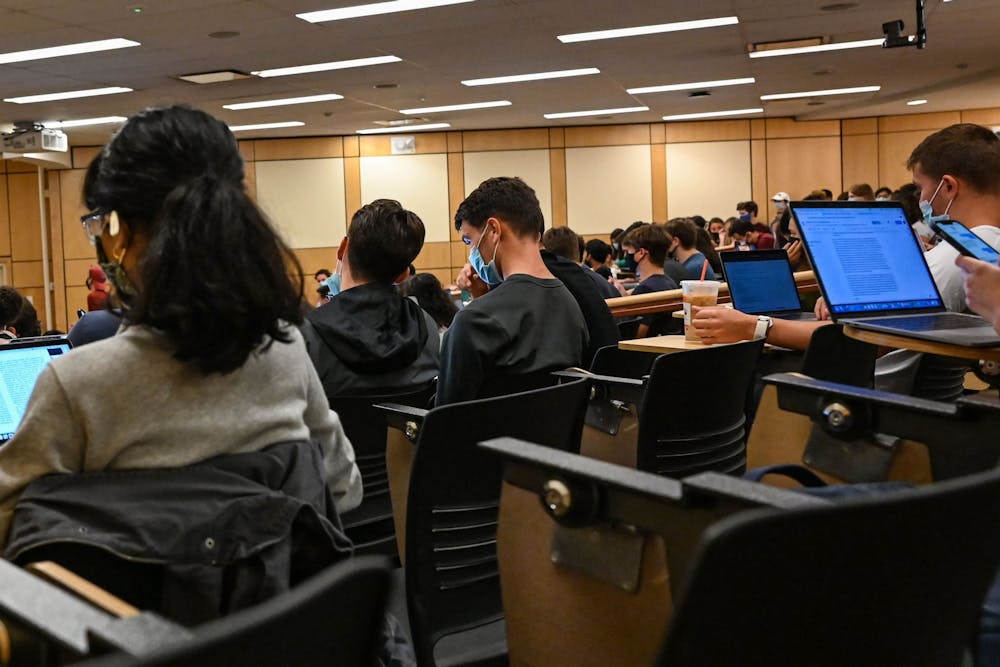
As in-person instruction resumed this week, students were excited to be back in the classroom — but some felt uneasy in large, crowded lectures.
Students largely said they were glad to be back in person and relieved that the University did not extend the virtual learning past Jan. 24. In smaller, seminar-style classes, students said they felt safe — as they were easily able to socially distance — but many expressed concerns about potential COVID-19 transmission in larger lectures.
Natasha Balogh, a first-year post-baccalaureate student in the LPS program, said that her view on going back in person “shifts back and forth.” Although she does not live with immunocompromised individuals, she is concerned she will contract COVID-19 and experience long-haul symptoms. She added that experience in PSYC 001: "Introduction to Experimental Psychology" has been stress-inducing.
“My 400-person class [PSYC 001] has brought me a bit of anxiety, given that we're all so tightly nestled together,” Balogh said. “It was very much a ‘sardines in a can’ experience.”
College juniors Kira Lucas and Criston Young, who also take PSYC 001, agreed with Balogh.
“It was super packed. Every single seat in Meyerson B1 — [the lecture hall] — was filled,” Lucas said.
Balogh, Lucas, and Young all said that their smaller classes had seats where students were spaced out, so they felt safer. They also said that the majority of students in all of their classes seemed to be following the indoor masking policy, which requires students to double-mask or wear a KN95 or N95 mask.
College senior Isabel Casares, on the other hand, said that her first week of classes has differed from many of her peers — since three of her four courses are still being taught virtually. She added that one of her professors confirmed that he has contracted COVID-19, which is why the class is currently being held online.
Casares said that starting out her senior spring semester with only one course being taught in person has been “disappointing, at least to some degree.”
“I think online classes are definitely not the same as being in person, because you miss out on such a big socialization component," Casares said. "It can be difficult for some material to translate well onto computers, especially for discussion-based classes."
Despite difficult aspects of virtual learning, though, Casares added that she's glad Penn's testing procedures could identify cases so that her instructors did not come to class sick, potentially spreading the virus to students. The University continues to report that there has been no proof of COVID-19 transmission due to in-person classes.
Still, when students do feel sick, the University recommends that they stay home in an effort to protect the community, Chief Wellness Officer Benoit Dubé told The Daily Pennsylvanian on Jan. 20.
At first, PSYC 001 visiting professor Andrew Ward told students that the lecture would not be recorded due to the University’s transition back to in-person learning, upsetting many students who believed they should be able to miss class due to COVID-19 without fear of falling behind. Balogh, Lucas, and Young all said that the policy felt unfair to students who may miss class due to COVID-19, especially with a relatively high positivity rate on campus.
Since then, Ward sent an email to students, notifying them that the Director of Undergraduate Studies in Psychology Elizabeth Brannon gave him permission to record every lecture and post them after the class.
Young said professors should still record lectures, regardless of COVID-19.
“Even though the virtual format was forced upon us by COVID-19, I feel like the virtual format has really good pros for learning the material,” Young said.
Penn announced in December its plan to delay move-in and begin the spring semester with virtual classes in light of the highly transmissible Omicron variant. As some students began to return to campus during the week from Jan. 9 to Jan. 15, the number of students in isolation surged to a record high of 1,314. Earlier this week, the University reopened indoor dining on Jan. 24 and loosened restrictions on social gatherings on Jan. 25, as cases have continued to decline.
“Everybody that I know is very happy that we're back. They were dreading the possibility that we could be virtual for longer. My program is a very tight-knit community, so that’s part of why everybody was really excited to be back, ” Balogh says.
Tori Sousa contributed reporting to this article.
The Daily Pennsylvanian is an independent, student-run newspaper. Please consider making a donation to support the coverage that shapes the University. Your generosity ensures a future of strong journalism at Penn.
Donate







